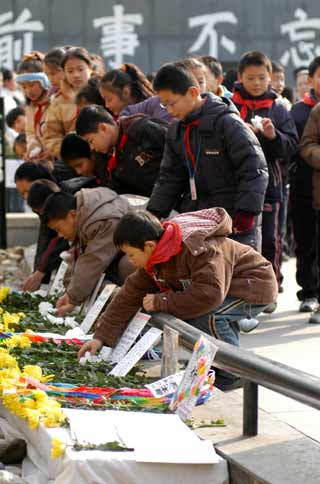The Good Son Falters:
By Christian Caryl and Akiko KASHIWAGI
[Abe Shinzo, Japan’s nationalist prime minister, surprised many observers with a strong start abroad. Now he’s in trouble at home. Caryl and Kashiwage show how distant the Abe Junzo regime’s ideologically-driven obsessions with constitutional revision and patriotic education are from the pocketbook issues that concern most Japanese voters. Their findings were backed up recently with empirical proof. A Yomiuri newspaper opinion poll released on February 20th shows that Abe’s pet issue, constitutional revision, is listed as a priority by only 6.2% of respondents. This marginal level of support contrasts sharply with the 61.7% ranking for reforms to social security, 52% for economic and employment initiatives, and 34% for child-care and other policies dealing with the dwindling birthrate, issues on which the Abe administration has been virtually silent. Even the “
In the same issue of Newsweek, commentator Yoichi Funabashi points to Japan’s international isolation in the wake of the recent

Heading down? Abe has seen his poll
numbers drop dramatically in the five
months since he took office.
The man who runs
Time was
Abe’s tenure has been complicated by what one could call his “conservative idealism”—a sensibility shaped both by his status as heir to a long line of conservative politicians and as the first Japanese prime minister born after the war. Abe aims to free
The polls show a politician in free-fall. In just four months, Abe’s popularity has plummeted by 30 points. That’s left him with a 37 percent approval rating, but “the problem is that the drop has been so fast,” says political commentator Kichiya Kobayashi. “There are no signs of how it might be reversed.”
The speed of Abe’s collapse may be surprising, but one cause is clear: surrounded by young and inexperienced advisers, he can’t stay focused on the problems that worry voters. Abe talks with dogged persistence about that goal of a “beautiful country” that can be unashamedly proud of itself. But indications are that ordinary Japanese are more concerned with their pensions and health-care system. The prime minister has pushed for a grand educational reform to boost patriotism, but his constituents think more about large class sizes and plummeting test scores. Abe’s conservative agenda may resonate with his right-wing base, but it won’t get him through two electoral tests he faces in the months ahead. “[Local party members] don’t talk about the Constitution,” concedes LDP spokeswoman Satsuki Katayama. They are focused instead on bringing money and jobs to their constituencies, she says.
Not only has Abe failed to respond; he can’t even control his government. This is perhaps his surprising failure so far. Abe hails from one of
The result has been chaos: two top officials have been forced to resign over the mishandling of public funds. Abe’s come under fire not censuring his Health minister, who on January 27 referred to
Defenders of the prime minister point out that
What’s ironic about all of this is that Koizumi faced similar criticism from the left during his tenure, especially in his last year in power. Yet he never suffered anything like Abe’s crash. That’s because Koizumi never lost control of the political process and appealed directly to voters with a clear and persuasive message about the need for reform. Koizumi famously declared that he was out to “destroy the LDP” and the traditional system of vested interests, which he assured voters would give a huge boost to
Other than his nationalist credo, Abe has been unable to come up with such a direct pitch or present himself as a reformer. His popularity took its biggest hit last December, when he readmitted to the LDP 11 conservatives Koizumi had exiled for their resistance. LDP headquarters was promptly swamped by thousands of messages from angry voters protesting the decision. Admits LDP spokeswoman Satsuki Katayama: “We clearly underestimated this.”
Such events point at an even thornier problem Abe must confront. In April and July, his camp faces a series of key elections they likely can’t win without the help of the LDP’s well-oiled machine. Yet if Abe seems to capitulate to the old guard, he risks alienating voters hungry for more reform. Faced with such choices, Koizumi could always bank on his great popular support. “[But Abe] has to build up his own power base,” says Satomi Tani, a political-science professor from
Without it, Abe is unlikely to force the LDP into line. “Koizumi generated an air of fear,” notes Kobayashi. But Abe, he says, won’t crack heads or give clear marching orders to the bureaucracy or his party. As a result, says Toranosuke Katayama, a key LDP member in Parliament’s upper house, “Team Abe” is struggling to keep its grip on the LDP. While the party’s old-timers may have resented Koizumi’s hard line, they like Abe’s indecisiveness even less. As
In the meantime, infighting between the cabinet and civil servants is getting worse. The ministerial scandals appear to have been triggered by information leaked from once powerful civil servants who, according to MIT’s Samuels, may be trying to wreak their revenge for the marginalization they suffered under Koizumi. Rumors about a cabinet reshuffle have also been leaked by disgruntled LDP members.
All these problems could soon come to a head. The upcoming elections could prove a bellwether for Abe’s government. Optimists argue that the prime minister’s poll numbers aren’t that bad, and that Koizumi was able overcome a similar slump. Moreover, the opposition, led by the Democratic Party of Japan, has so far proved strikingly inept in its own right.
Yet threats are looming, even in an area where Abe’s done relatively well: foreign policy. So far he’s managed to avoid the unresolved historical controversies over

Chinese students place flowers in front of
a monument for victims during a gathering
marking the 68th anniversary of the Nanjing
Massacre in Nanjing, Dec. 13, 2005.
Meanwhile,
This article appeared in the
Christian Caryl, the Tokyo Bureau Chief of Newsweek, has worked as a journalist in 35 countries, including Iraq, Afghanistan, Russia, and



